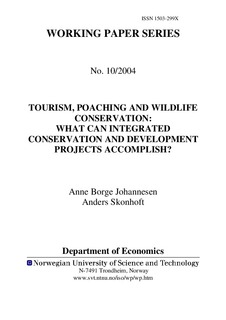| dc.contributor.author | Johannesen, Anne B. | nb_NO |
| dc.contributor.author | Skonhoft, Anders | nb_NO |
| dc.date.accessioned | 2014-12-19T14:31:50Z | |
| dc.date.available | 2014-12-19T14:31:50Z | |
| dc.date.created | 2006-10-03 | nb_NO |
| dc.date.issued | 2004 | nb_NO |
| dc.identifier | 126092 | nb_NO |
| dc.identifier.uri | http://hdl.handle.net/11250/267117 | |
| dc.description.abstract | Integrated Conservation and Development Projects (ICDPs) have frequently been established in Africa to improve wildlife conservation and the welfare of local communities. However, their effectiveness so far has been hampered by conflicts and illegal harvesting activities. Within a Gordon-Schäfer-type model, this paper focuses on the strategic interaction between the manager of a protected area and a group of local people living near the park. The park manager benefits from wildlife through non-consumptive tourism and safari hunting. The local people benefit through hunting, although this is illegal according to existing laws, but they also bear costs as wildlife causes agricultural damage. Depending on the economic and ecological environment, we show that ICDPs relying on money transfers to the local people derived from the park manager's activities may or may not promote wildlife conservation. In addition, we demonstrate that the effects on the welfare of the local people are ambiguous. | nb_NO |
| dc.language | eng | nb_NO |
| dc.publisher | Institutt for samfunnsøkonomi | nb_NO |
| dc.relation.ispartofseries | Working Paper Series, 1503-299X; 2004:10 | nb_NO |
| dc.title | Tourism, Poaching and Wildlife Conservation: What can Integrated Conservation and Development Projects accomplish? | nb_NO |
| dc.type | Research report | nb_NO |
| dc.contributor.department | Norges teknisk-naturvitenskapelige universitet, Fakultet for samfunnsvitenskap og teknologiledelse, Institutt for samfunnsøkonomi | nb_NO |
